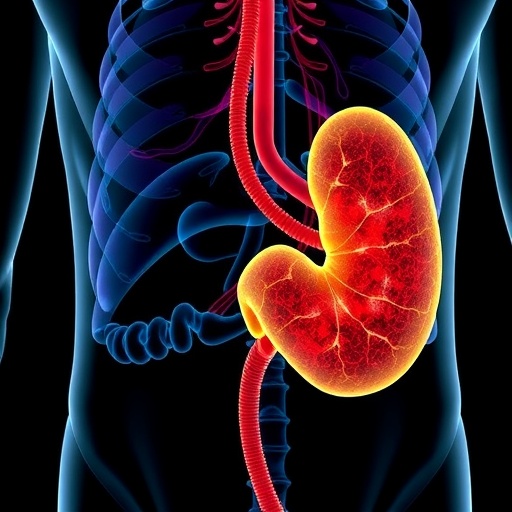In a groundbreaking retrospective study published in BMC Cancer, researchers have shed new light on the clinical implications of biliary drainage in patients battling unresectable pancreatic cancer treated with a combination of nanoliposomal irinotecan alongside fluorouracil and folinic acid (NFF). This investigation, stemming from the NAPOLEON-2 study, delves deep into survival outcomes and safety profiles, particularly focusing on the nuanced interplay between bile duct interventions and systemic chemotherapy efficacy.
Pancreatic cancer remains a formidable oncological challenge, often diagnosed at stages where surgical resection is not feasible. In these advanced cases, systemic chemotherapy is the cornerstone of management. Nanoliposomal irinotecan, a refined formulation designed to enhance drug delivery and cytotoxicity, when paired with fluorouracil and folinic acid, represents the standard salvage regimen following progression on gemcitabine-based therapies. However, the influence of biliary drainage—commonly necessitated by malignant biliary obstruction—on treatment efficacy and toxicity profiles has remained largely undefined until now.
The retrospective arm of the NAPOLEON-2 study incorporated 161 patients, all of whom received NFF as second- or later-line therapy, having previously undergone gemcitabine regimens. This robust dataset enabled investigators to perform a granular analysis, stratifying patients into groups based on the presence or absence of biliary drainage and serum bilirubin levels prior to chemotherapy initiation. The primary endpoint assessed was overall survival (OS), supplemented by secondary measures including progression-free survival (PFS), objective response rates, disease control rates, dose intensity, and incidence of adverse events.
Interestingly, the study revealed no statistically significant difference in OS between patients who underwent biliary drainage and those who did not. Median overall survival rates were noted at 7.6 months for the biliary drainage cohort and 9.1 months for the non-drained group, with a hazard ratio of 1.09, underscoring a negligible impact of biliary decompression on survival outcomes in this context. These findings challenge pre-existing assumptions that biliary drainage might potentially compromise systemic chemotherapy efficacy due to infection risks or altered pharmacodynamics.
Nonetheless, safety analyses painted a more complex picture. While biliary drainage did not hinder therapeutic effectiveness, it correlated with an increased incidence of severe hematological toxicities and biliary tract infections. This observation signals the need for vigilant monitoring and proactive management of infectious complications in patients undergoing biliary interventions within systemic chemotherapy paradigms. Such insights are pivotal, as hematological adverse events can necessitate dose reductions or therapy discontinuations, potentially impacting patient quality of life and treatment adherence.
A particularly striking facet of the analysis was the impact of serum bilirubin levels prior to NFF administration. Patients presenting with total bilirubin concentrations equal to or above 1.0 mg/dL experienced significantly poorer outcomes, with median OS truncated to 5.4 months compared to 8.9 months in those with bilirubin levels below this threshold. Elevated bilirubin also predisposed patients to a marked increase in severe hematological adverse events, observed in 56% of the high bilirubin group versus 26% in the lower range cohort. These data highlight serum bilirubin as a prognostic biomarker and potential risk stratifier in the treatment planning for unresectable pancreatic cancer.
The biological underpinnings for these bilirubin-related disparities may lie in impaired hepatic metabolism and systemic inflammatory milieu associated with cholestasis. Such physiological derangements could alter drug clearance, augment toxicity, and attenuate therapeutic benefit. Consequently, these findings prompt considerations for tailored dosing strategies or adjunctive supportive care in hyperbilirubinemic patients receiving NFF.
Beyond the clinical implications, the study exemplifies the real-world applicability of NFF as a treatment modality, affirming its role across diverse patient subsets regardless of biliary intervention status. The absence of compromised overall survival due to biliary drainage, coupled with the identification of elevated bilirubin as a significant prognostic factor, provides actionable intelligence to oncology practitioners weighing the risks and benefits of biliary decompression in complex pancreatic cancer cases.
Further research is warranted to prospectively validate these retrospective findings and explore mechanistic pathways influencing chemotherapy pharmacokinetics and toxicity in the context of biliary obstruction. Additionally, integration of novel biomarkers and refined patient selection criteria could facilitate personalized therapeutic approaches, optimizing outcomes while minimizing adverse effects.
The NAPOLEON-2 study illuminates a nuanced therapeutic landscape where interventional procedures and systemic chemotherapy converge. Its insights empower clinicians with evidence-based guidance to navigate treatment decisions in the challenging scenario of unresectable pancreatic ductal adenocarcinoma, underscoring that while biliary drainage might not impede survival gains from NFF, elevated bilirubin remains a critical hurdle demanding targeted strategies.
Ultimately, this research underscores the imperative for multidisciplinary collaboration encompassing oncologists, gastroenterologists, and interventional radiologists to harmonize care pathways. Through such integrative efforts, the prospects of extending meaningful survival and enhancing quality of life for patients facing advanced pancreatic cancer can progressively improve, fueled by data-driven precision medicine and vigilant clinical stewardship.
The impact of these findings resonates beyond pancreatic cancer, reminding the scientific community of the intricate interplay between tumor biology, host physiology, and therapeutic interventions. As novel chemotherapeutic agents and combination regimens evolve, comprehensive assessments encompassing procedural adjuncts and biochemical parameters will be increasingly vital to refining oncology care paradigms.
In essence, the retrospective results from the NAPOLEON-2 study enrich our understanding of treatment dynamics in unresectable pancreatic cancer, advocating for a personalized approach that carefully considers biliary status and liver function markers. By spotlighting bilirubin as a prognostic indicator and delineating the safety profile associated with biliary drainage, the study paves the way for optimized therapeutic protocols poised to transform the clinical management of this formidable disease.
Subject of Research: Investigating the effects of biliary drainage and serum bilirubin levels on the efficacy and safety of nanoliposomal irinotecan combined with fluorouracil and folinic acid in patients with unresectable pancreatic cancer.
Article Title: Impact of biliary drainage for unresectable pancreatic cancer treated with nanoliposomal irinotecan with fluorouracil and folinic acid: retrospective results from the NAPOLEON-2 study.
Article References:
Nishikawa, K., Otsuka, T., Shimokawa, M. et al. Impact of biliary drainage for unresectable pancreatic cancer treated with nanoliposomal irinotecan with fluorouracil and folinic acid: retrospective results from the NAPOLEON-2 study. BMC Cancer 25, 1614 (2025). https://doi.org/10.1186/s12885-025-14992-2
Image Credits: Scienmag.com




